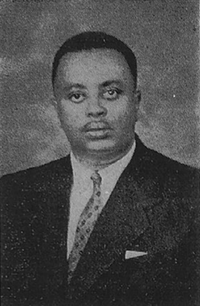Louis Rwagasore | |
|---|---|
 Rwagasore in 1961 | |
| 2nd Prime Minister of Burundi | |
| In office 28 September 1961 – 13 October 1961 | |
| Monarch | Mwambutsa IV |
| Governor | Jean-Paul Harroy |
| Preceded by | Joseph Cimpaye |
| Succeeded by | André Muhirwa |
| Personal details | |
| Born | 10 January 1932 Gitega, Ruanda-Urundi (now Burundi) |
| Died | 13 October 1961 (aged 29) Usumbura, Ruanda-Urundi (now Bujumbura |
| Manner of death | Assassination by gunshot |
| Political party | UPRONA |
| Spouse |
Marie-Rose Ntamikevyo
(m. 1959) |
| Parent |
|
Prince Louis Rwagasore (Kirundi: Ludoviko Rwagasore; 10 January 1932 – 13 October 1961) was a Burundian prince and politician, who was the second prime minister of Burundi for two weeks, from 28 September 1961 until his assassination on 13 October.
Born to the Ganwa family of Burundian Mwami (king) Mwambutsa IV in Belgian-administered Ruanda-Urundi in 1932, Rwagasore was educated in Burundian Catholic schools before attending university in Belgium. After he returned to Burundi in the mid-1950s he founded a series of cooperatives to economically empower native Burundians and build up his base of political support. The Belgian administration took over the venture, and as a result of the affair his national profile increased and he became a leading figure of the anti-colonial movement.
He soon thereafter became involved with a nationalist political party, the Union for National Progress (UPRONA). He pushed for Burundian independence from Belgian control, national unity, and the institution of a constitutional monarchy. Rwagasore sought to bring UPRONA mass appeal across different regions, ethnicities, and castes, and under him the party maintained a leadership balanced between ethnic Hutus and Tutsis, though the latter were usually favoured for more important positions. The Belgian administration disliked UPRONA and initially attempted to stifle Rwagasore's activities, placing him under house arrest in 1960 during municipal elections.
International pressure led the administration to back down, and the following year UPRONA won an overwhelming majority in the legislative elections. As a result, Rwagasore became prime minister of Burundi on 28 September 1961. Two weeks later, he was gunned down by a Greek national at the direction of leaders of a rival political party with the probable support of the Belgian Resident in Burundi. Rwagasore's death derailed his attempts to build national ethnic cohesion and facilitated the growth of Hutu–Tutsi tensions in the country. It also fractured UPRONA, as his former lieutenants engaged in a power struggle to succeed him as the party's leader. Within Burundi, Rwagasore enjoys nearly universal acclaim, and his assassination is commemorated annually with large ceremonies. He remains relatively unknown internationally in comparison to other leaders of independence movements in the African Great Lakes region.
Cite error: There are <ref group=lower-alpha> tags or {{efn}} templates on this page, but the references will not show without a {{reflist|group=lower-alpha}} template or {{notelist}} template (see the help page).